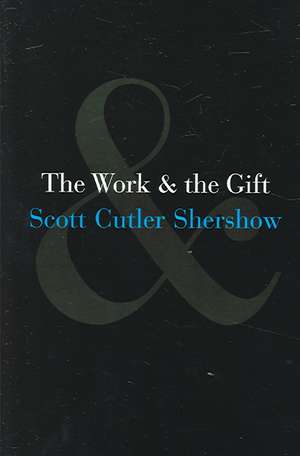The Work and the Gift
Autor Scott Cutler Shershowen Limba Engleză Paperback – 30 iun 2005
The Work and the Gift considers how working and giving are taken for opposites and revealed as each other's ghostly shadow. We ask ourselves, for instance, to work for a wage and a living, dooming ourselves forever to the curse of daily toil; and yet we imagine the magnum opus or the oeuvre as a labor of love. We ask ourselves to give with no thought of return; yet we still tell ourselves to give only to the deserving and only where our giving will do some good.
Ranging from Marx and Derrida to Friedrich Hayek and Alvin Toffler, Scott Cutler Shershow here explores the predictions of political thinkers on both the left and the right that work is fundamentally changing, or even disappearing; the debates among anthropologists and historians about an archaic gift-economy that preceded capitalism and might reemerge in its wake; contemporary political battles over charity and social welfare; and attempts by modern and postmodern artists to destabilize the work of art as we know it.
Ultimately, Shershow joins other contemporary thinkers in envisioning a community of unworking, grounded neither in ideals of production and progress, nor in an ethic of liberal generosity, but simply in our fundamental being-in-common. What results is a brilliant intervention in critical theory and social thought that will be of enormous value to students of literary criticism, anthropology, and philosophy alike.
Ranging from Marx and Derrida to Friedrich Hayek and Alvin Toffler, Scott Cutler Shershow here explores the predictions of political thinkers on both the left and the right that work is fundamentally changing, or even disappearing; the debates among anthropologists and historians about an archaic gift-economy that preceded capitalism and might reemerge in its wake; contemporary political battles over charity and social welfare; and attempts by modern and postmodern artists to destabilize the work of art as we know it.
Ultimately, Shershow joins other contemporary thinkers in envisioning a community of unworking, grounded neither in ideals of production and progress, nor in an ethic of liberal generosity, but simply in our fundamental being-in-common. What results is a brilliant intervention in critical theory and social thought that will be of enormous value to students of literary criticism, anthropology, and philosophy alike.
Preț: 274.22 lei
Nou
Puncte Express: 411
Preț estimativ în valută:
52.48€ • 54.48$ • 43.76£
52.48€ • 54.48$ • 43.76£
Carte tipărită la comandă
Livrare economică 25 martie-08 aprilie
Preluare comenzi: 021 569.72.76
Specificații
ISBN-13: 9780226752570
ISBN-10: 0226752577
Pagini: 248
Dimensiuni: 152 x 229 x 23 mm
Greutate: 0.38 kg
Ediția:1
Editura: University of Chicago Press
Colecția University of Chicago Press
ISBN-10: 0226752577
Pagini: 248
Dimensiuni: 152 x 229 x 23 mm
Greutate: 0.38 kg
Ediția:1
Editura: University of Chicago Press
Colecția University of Chicago Press
Notă biografică
Scott Cutler Shershow is professor of English at the University of California, Davis. He is the author of Puppets and "Popular" Culture and Laughing Matters: The Paradox of Comedy. He is also coeditor of Marxist Shakespeares.
Cuprins
Acknowledgments
Introduction
Part One - The End(s) of Work
1. Defining a Crisis
The Double Necessity of Work
Marxism and the Soviet Disaster
Hannah Arendt's Critique
"The Great Work Begins"
2. Free-Market Futurism
On the "Postindustrial"
Alvin Toffler and Peter Drucker
The "Autonomous" Workforce
Corporate Culture and Corporate Cant
3. Liberal Nostalgia
After Work
Robert L. Heilbroner's World of Work
4. Marxism and Post-Marxism
Toward a Liberation of Work
André Gorz: Reclaiming Work
Michael Hardt, Antonio Negri, and Autonomist Marxism
Part Two - The Work of the Gift
5. From Restricted to General Economy—and Back Again?
Of Sinking
Rethinking the Gift
General Economics in Retrospect and Prospect
6. Anthropologies of the Gift
Marcel Mauss: The Gift Economy and Its Other
Knowledge and/of the Gift
Pierre Bourdieu: From Gift Economy to Cultural Capital
Georges Bataille: Beyond Anthropology
7. Charity and Welfare: The Gifts as Work
The End of Welfare
Welfare and Work
Marvin Olasky and Gertrude Himmelfarb
Tocqueville on Pauperism
The "New Philanthropy"
8. Theologies of Culture: The Work as Gift
The Gift of Art
On the "Work Ethic"
Kant and Beyond
Hayek on "Liberty"
Part Three - Toward a Community of "Unworking"
9. Arts and Ends
Reopened Questions
Unworking the Work
Plagiarism and Potlatch
Maurice Blanchot and "Unworking"
10. Marxism and the General Economy
On Means and Ends
Marxism at Its Limit
Finitude and Community
Notes
References
Index
Introduction
Part One - The End(s) of Work
1. Defining a Crisis
The Double Necessity of Work
Marxism and the Soviet Disaster
Hannah Arendt's Critique
"The Great Work Begins"
2. Free-Market Futurism
On the "Postindustrial"
Alvin Toffler and Peter Drucker
The "Autonomous" Workforce
Corporate Culture and Corporate Cant
3. Liberal Nostalgia
After Work
Robert L. Heilbroner's World of Work
4. Marxism and Post-Marxism
Toward a Liberation of Work
André Gorz: Reclaiming Work
Michael Hardt, Antonio Negri, and Autonomist Marxism
Part Two - The Work of the Gift
5. From Restricted to General Economy—and Back Again?
Of Sinking
Rethinking the Gift
General Economics in Retrospect and Prospect
6. Anthropologies of the Gift
Marcel Mauss: The Gift Economy and Its Other
Knowledge and/of the Gift
Pierre Bourdieu: From Gift Economy to Cultural Capital
Georges Bataille: Beyond Anthropology
7. Charity and Welfare: The Gifts as Work
The End of Welfare
Welfare and Work
Marvin Olasky and Gertrude Himmelfarb
Tocqueville on Pauperism
The "New Philanthropy"
8. Theologies of Culture: The Work as Gift
The Gift of Art
On the "Work Ethic"
Kant and Beyond
Hayek on "Liberty"
Part Three - Toward a Community of "Unworking"
9. Arts and Ends
Reopened Questions
Unworking the Work
Plagiarism and Potlatch
Maurice Blanchot and "Unworking"
10. Marxism and the General Economy
On Means and Ends
Marxism at Its Limit
Finitude and Community
Notes
References
Index
